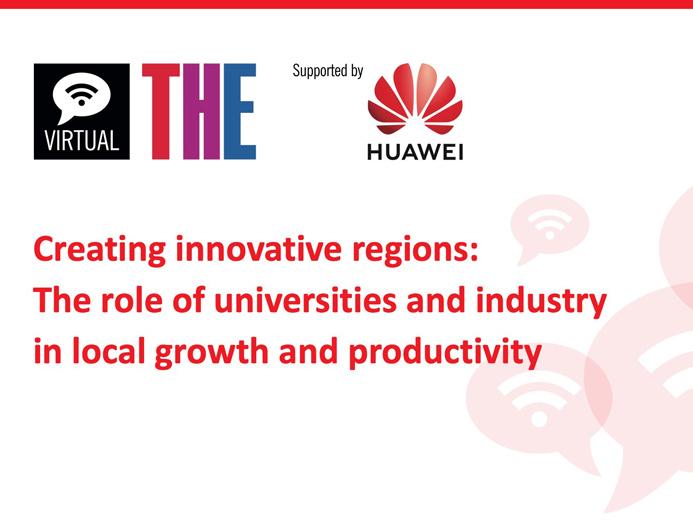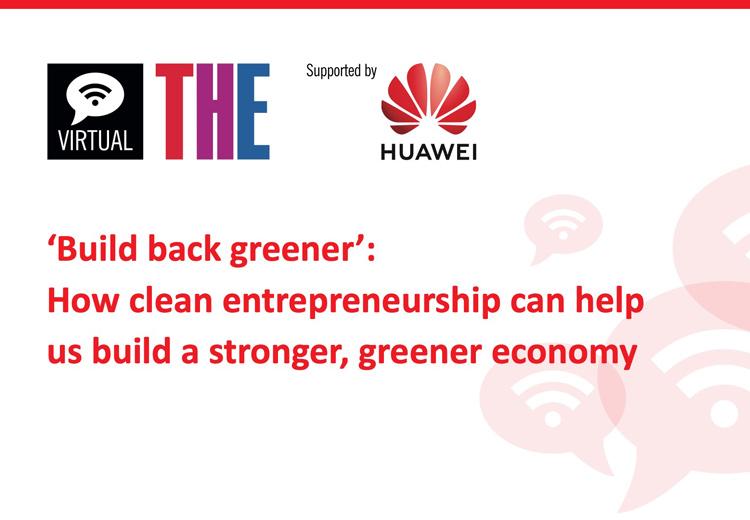
Strengthening local economies and skills through civic engagement

The landscape of research funding is undergoing a significant period of change, both in response to the UK government’s plans for a “levelling up” agenda and following the results of the 2021 Research Excellence Framework. Greater civic engagement and collaboration with multiple stakeholders is therefore increasingly central to university strategies and success.
At a virtual round-table event hosted by Times Higher Education in partnership with Huawei, a panel of leaders from academia, research and development met to discuss some of the challenges facing higher education institutions, particularly as many struggle to retain the finances needed to reach their full potential.
The panellists agreed that both higher education and industry played an important role in the prosperity of local regions. But within this, there are “various roles universities and businesses can and should play according…to their location and mission”, said Michael Rayner, dean of research and knowledge exchange at the University of the Highlands and Islands.
“That civic mission and celebration of our regions has been [a key focus] for universities for a long time,” added Peter Dunstan, deputy pro vice-chancellor at Swansea University.
The shift in the current climate, Dunstan said, meant that there was “more of a drive” to work effectively with industry and various enterprises. “The changing landscape of funding is what makes it a challenge – when different stakeholders start being involved in that distribution of funds,” he said.
Several of the universities represented on the panel were recipients of the UK government’s European Regional Development Fund, the future of which has been left uncertain since the UK left the European Union. Similarly, levelling-up funding “is not clear”, said Charmaine Stint, senior development manager at Birmingham City University. “But there are things we can explore collectively,” she added.
Mariachiara Di Cesare, director of the Institute for Public Health and Wellbeing at the University of Essex, made the point that since universities are often all using the same funding, it makes sense for them to integrate their strategies more frequently.
One idea raised by Maggie McGowan, director of research and innovation at the University of Hull, was for government funders to set up a collaborative fund designed for universities to work together on challenges. “Potentially, we could have stronger policy impact if we collaborate,” she said.
The panellists shared several examples of collaborative projects where their institutions worked with local industry partners, as well as with public and local authority groups.
Teresa Raventos, research partnership manager at the University of Leicester, spoke of how her university had produced studies with local groups to learn more about talent retention for the local area. “We learned that there was no place for skilled people to obtain highly technical jobs…The key answer is to nurture those companies with technical jobs to stay here,” she said.
The levelling-up agenda had proven “useful” in talent retention, Raventos added, generating contact from industry members interested in partnering with the university in order to capitalise on funding.
To evaluate multi-stakeholder networks to better support local economic growth, Sarah Lethbridge, pro dean of external engagement at Cardiff Business School, stressed the importance of networking and serendipitous meetings. “Getting out there and getting to know people – something universities often don’t give people the time or the budgets to do,” she said.
“Because universities are so diverse and the communities we engage with are equally so…it’s important to recognise we play a facilitating role, too, rather than leading,” said Robert Wapshott, associate professor in entrepreneurship and innovation at Nottingham Business School. “There isn’t necessarily a uni-shaped solution all the time,” he concluded.
The panel:
- Emma Davies, head of research environment and development, Staffordshire University
- Mariachiara Di Cesare, director of the Institute for Public Health and Wellbeing, University of Essex
- Peter Dunstan, deputy pro vice-chancellor of entrepreneurship, knowledge exchange and partnerships, Swansea University
- Julia Gilmore, content manager, Times Higher Education (chair)
- Nathaniel Golden, research and partnership development manager, Nottingham Trent University
- Sarah Lethbridge, pro dean of external engagement, Cardiff Business School
- Maggie McGowan, director of research and innovation, University of Hull
- Teresa Raventos, research partnership manager, University of Leicester
- Michael Rayner, dean of research and knowledge exchange, University of the Highlands and Islands
- Ashley Ritchie, research manager, Oxford Brookes University
- Charmaine Stint, senior development manager, Birmingham City University
- Robert Wapshott, associate professor in entrepreneurship and innovation, Nottingham Business School
Find out more about Huawei and higher education.

